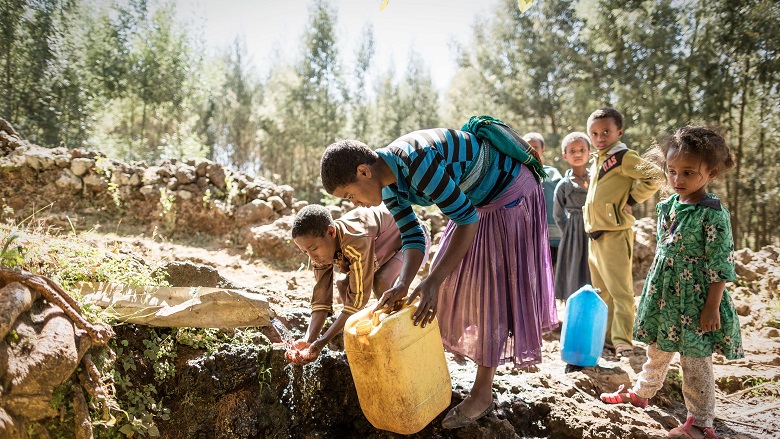
Fatuma and her three family members are living in a village called Shebel Kebele, Shebel Berenta Woreda of Eastern Gojam Zone only a few kilometers away from Bichena town, but her village has no access to energy.
Fatuma’s village is among the main tributaries of the Blue Nile, a stream known as Suha River with a recurrent flow year long. However, Fatuma and her dwellers do not know what electricity means.
As a result of lack of electric power, Fatuma and her neighbors have been using firewood for all sorts of cooking and light. As learnt from Fatuma, women are responsible for collecting firewood in the area. They are forced to trek up to an hour and spend three to four hours collecting firewood in the dense forests and return home carrying the wood on their back and shoulder.
As to Fatuma, they spend at least half day collecting firewood at least twice or trice a week. Since it is very difficult to collect the firewood alone in the area, females go together to protect themselves from any form of assault.
In the rural part of Ethiopia, women spend 13 to 15 hours a day carrying out unpaid household works due to lack of technological advancements which potentially limits their opportunities to participate in education, profitable and paid works. Since they spend their time collecting firewood, fetching water from rivers and even cooking using firewood for activities that should have been undertaken using energy, their rights are directly or indirectly violated.
According to the Ministry of Women, Children and Youth Affairs, since one percent of the women population in the country is engaged in formal paid jobs, the country’s GDP only growths by 0.02 percent. Almost all Ethiopian women living in the rural parts of the country spent their life dealing with exhausting unpaid household works and have no access to paid jobs, it states.
In a country where over 80 percent of its population resides in the rural parts and women represents over 51 percent of the close to 110 million population, the economic, social and human right violations of the women and the socio-economic and political influences on them is hard to express, Minyamir Yitayew, Women Capacity Building Team Leader at the Ministry told The Ethiopian Herald.
As a common Ethiopian saying goes, “One who owns all lacks a petite” or yeabayin lij wuha temaw, said Fatuma, though we are living at the vicinity of the source of the Blue Nile, we are forced to lead a disgusting life due to shortage of energy.
As collecting firewood especially at this time when the amount of dense forest has become dwindled is quite tough, and trying, said Fatuma, it is impossible to carry out other engagements back home. However, she added, women in the rural part of the country are responsible for all household activities which take the whole day making people busy.
Cooking with firewood hardly affects women and children’s’ health as it has exposed them to respiratory and eye problems, she added. Obviously, she added, the health of mothers in the rural areas has a spillover effect on the health of the family members. Worse even, students are forced to use candle for studying, but it is also unavailable and sometimes impossible to get due to financial constraints.
As deduced from the letter the Ethiopian Ministry of Foreign Affairs (MoFA) wrote to the United Nations Security Council (UNSC), two-thirds of school children in Ethiopia have no access to electricity. In Ethiopia currently over 29 million children are in school, hence according to MoFA two-thirds of these children are forced to stay in darkness which makes situations impossible to read and do homework. Many Ethiopians have been using the above expression to describe the harshness of the situation.
Minyamir also noted that Ethiopian women in the rural areas almost all the time spend their time undertaking non-paid routines such as fetching water, collecting firewood and doing a range of household chores. Lack of infrastructure and energy has forced women to spend almost 18 hours a day running infertile activities.
As to him, absence of energy limits Ethiopian women active participation in paid jobs out of education, directly or indirectly exposes them to unwanted pregnancy, too.
The team leader also stated that women have the right to economic prosperity, to be protected from any attack and creating a wealth, but it is impossible for rural ones since they are far from education which is a viable manes to be productive. Such a daunting problem has resulted in a serious rural urban migration and illegal human trafficking in search of better life. The attacks performed on women such as rape remain unreported in rural areas, he added.
Not only exacerbates lack of access to energy deforestation but it also adversely affects the vitality of the Nile water. Taking all this ups and downs into consideration and swallowing the present facts and truths, as to the letter, the completion of the Grand Ethiopian Renaissance Dam (GERD) is an urgent and a timely call as it will help millions of Ethiopians come out of the grip of darkness and abject poverty.
Fatuma and her counterparts have long awaited the completion of the GERD as it is a reliable means to alleviate the chronic energy shortage they have been experiencing for years. Egypt’s claim of “historical right” is just the only way to keep its hegemony over Nile and simply a reflection of selfish and evil act under the sun as the river accounts more than two third of Ethiopia’s surface water.
BY DARGIE KAHSAY
(Photo- Internet)





